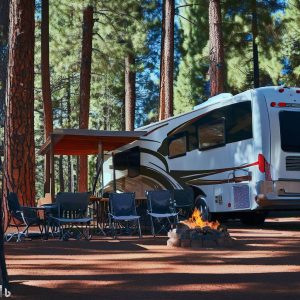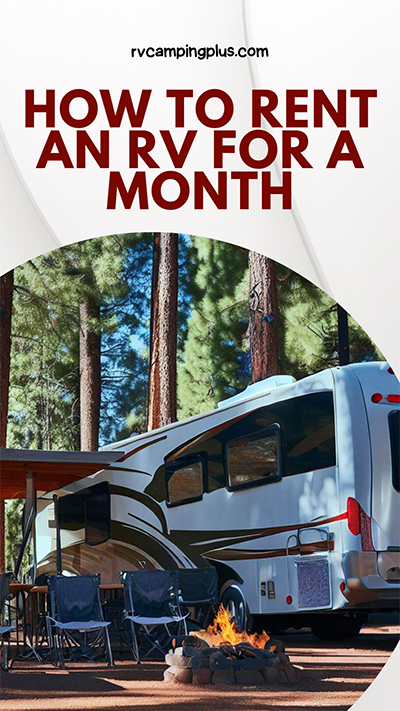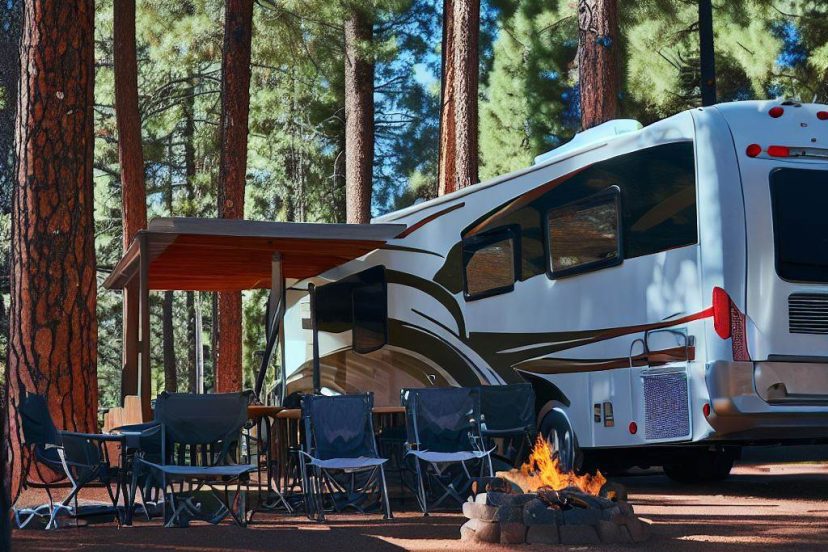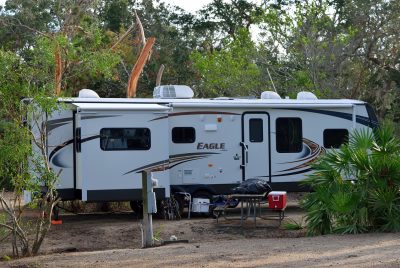How to Rent an RV for a Month and What to Consider
RV camping offers a unique and adventurous way to explore the world around us. I am excited to share some valuable insights on how to rent an RV for a month and what factors you should consider during the process. To Rent an RV for a month or longer period can be a great experience, but it needs proper planning and consideration to ensure a smooth and enjoyable journey. In this article, I’ll guide you through the necessary steps and provide helpful suggestions to make your month-long RV rental a success.
Renting an RV for a month opens up a world of traveling possibilities, allowing you to journey at your own pace and experience the freedom of the open road. From breathtaking landscapes to hidden gems off the beaten path, there’s so much to explore. But before embarking on your adventure, it’s important to lay the groundwork and make informed decisions.
Research and Planning Prior to Renting an RV
 The first step to rent an RV for a month is conducting some thorough research. Begin by exploring different RV rental options available in your area. Consider the size and type of RV that would suit your needs and preferences. Are you looking for a compact camper van or a spacious motorhome? Assess your requirements and determine the budget for the rental. It’s crucial to calculate the total cost, including the rental fees, mileage charges, and any additional expenses such as campground fees, fuel, and insurance.
The first step to rent an RV for a month is conducting some thorough research. Begin by exploring different RV rental options available in your area. Consider the size and type of RV that would suit your needs and preferences. Are you looking for a compact camper van or a spacious motorhome? Assess your requirements and determine the budget for the rental. It’s crucial to calculate the total cost, including the rental fees, mileage charges, and any additional expenses such as campground fees, fuel, and insurance.
Create a checklist of amenities and features you deem essential for your month-long RV rental. Do you need a fully equipped kitchen, a bathroom, or a comfortable sleeping area? Consider your comfort and convenience during the trip and ensure that the RV you choose meets your requirements.
Choosing the Right RV Rental Company
Selecting a reputable RV rental company is essential to ensure a positive and hassle-free experience. Take the initiative to read customer reviews, ratings, and recommendations. Look for RV rental companies with a proven track record of providing well-maintained and reliable vehicles.
In addition to customer feedback, consider the rental company’s policies. Look for flexibility in terms of pick-up and drop-off locations, rental durations, and reservation changes. Fair and transparent pricing is also crucial, so compare rental rates and look carefully for any hidden fees or charges.
Understanding the RV Rental Terms and Conditions
Once you’ve chosen a rental company, it’s vital to carefully read and understand the rental terms and conditions. Pay close attention to important details such as mileage restrictions, additional fees for exceeding mileage limits, and insurance coverage. Ensure that you are aware of the security deposit requirements and the process for its return.
If you find that you have questions or are unsure about the rental agreement, don’t hesitate to reach out to the rental company. Clear communication is critical for avoiding misunderstandings and ensuring a smooth rental experience.
Preparing for the Trip
Preparing for a month-long RV rental involves meticulous planning and organization. Create a detailed itinerary that outlines your intended route, including the destinations you wish to visit and the approximate travel time between each location. Research RV parks, campgrounds, and other suitable accommodations along your route and make reservations in advance to secure your spot. If you plan to stay somewhere for a long time, compare the different RV parks monthly rates so you can protect your budget.
Pack strategically, considering the duration of your trip and the storage space available in the RV. Include essential items such as bedding, kitchenware, toiletries, and outdoor equipment like camping chairs and a portable grill. Remember to pack appropriate clothing for different weather conditions and outdoor activities.
Before hitting the road, conduct a thorough inspection of the RV. Check the tires, brakes, lights, and fluid levels. Test the appliances, including the refrigerator, stove, and air conditioning. Familiarize yourself with the RV’s features and operation to avoid any issues during your trip.
Driving and Safety Tips
 Driving an RV, especially if you’re not accustomed to its size and handling, requires careful attention and adherence to safety guidelines. Take note of the following tips:
Driving an RV, especially if you’re not accustomed to its size and handling, requires careful attention and adherence to safety guidelines. Take note of the following tips:
- Familiarize yourself with the RV’s dimensions, including height, width, and length, to navigate through bridges, tunnels, and narrow roads safely.
- Adjust your driving style and acclimate to the increased size and weight of the RV. Allow for longer braking distances and avoid sudden maneuvers.
- Adhere to traffic rules and speed limits, especially in unfamiliar areas.
- Regularly check your mirrors and use them effectively to monitor your surroundings.
- Practice defensive driving techniques and be prepared for other drivers’ mistakes.
- Secure all loose items inside the RV to prevent your stuff from shifting or falling during transit.
- Perform regular maintenance checks, such as checking tire pressure and fluid levels, to ensure a safe and smooth journey.
Campground Etiquette and Regulations
As you embark on your month-long RV adventure, it’s crucial to be a responsible and respectful camper. Be familiar with the rules and regulations of the campgrounds and RV parks you plan to visit. Some general etiquette practices to follow include:
- Respect quiet hours and minimize noise to ensure a peaceful environment for everyone.
- Dispose of trash properly and keep the campground clean. Leave any campsite in the same or better condition than you found it.
- Observe any specific regulations regarding campfires, pets, and vehicle parking.
- Be mindful of your neighbors’ space and privacy, maintaining a reasonable distance between campsites.
- Follow any specific guidelines for waste disposal, including recycling and sewage management.
By adhering to campground etiquette and regulations, you contribute to a positive camping experience for yourself and fellow campers.
Getting the Most Pleasurable RV Camping Experience
Renting an RV for a month allows you to immerse yourself in the joys of RV camping fully. Here are some suggestions to enhance your experience:
- Embrace the flexibility and freedom RV camping offers. Take advantage of the opportunity to explore off-the-beaten-path destinations and discover hidden gems.
- Connect with other RV enthusiasts. Attend RV meetups or join online communities to share experiences, tips, and recommendations.
- Take time to enjoy nature. Engage in fun outdoor activities like fishing, hiking, or kayaking in the picturesque surroundings near your campsites.
- Capture memories through photography or journaling. Document your experiences and create lasting mementos of your RV adventure.
- Unplug from technology and appreciate the simplicity and serenity of RV camping. Limit screen time and savor the beauty of the natural world around you.
Rental RV Handling Unexpected Situations
- While you aim for a smooth and trouble-free trip, it’s essential to be prepared for unexpected situations. Here are some tips for handling challenges that may arise:
- Familiarize yourself with basic RV troubleshooting. Carry a first aid kit, spare parts, and essential tools to handle minor repairs.
- Have a contingency plan in case of mechanical breakdowns. Research nearby repair shops and have emergency contact numbers readily available.
- Be aware of weather conditions and potential hazards along your route. Be prepared to adjust your itinerary if necessary.
Maintain open communication with your travel companions. Discuss any emergency procedures and specify a plan for communication in case of separation or loss of cell service. - Consider purchasing travel insurance that also covers medical emergencies, trip cancellations, and RV-related incidents. This provides added peace of mind throughout your journey.
Remember, unforeseen challenges can arise during any trip, but with preparation and a calm mindset, you can navigate through them successfully.
Renting an RV for a month offers an exhilarating opportunity to embark on an unforgettable adventure. By following the steps outlined in this guide and considering the essential factors, you can ensure a seamless and enjoyable RV camping experience. From thorough research and planning to understanding rental terms, preparing for the trip, and embracing the joys of RV camping, you’ll be well-equipped for the journey ahead. So, pack your sense of adventure and embark on the road trip of a lifetime. Happy RV camping!
FAQs about Renting an RV for a Month
Can I rent an RV for less than a month?
Yes, many RV rental companies offer flexible rental durations, allowing you to rent for shorter periods such as a week or a few days.
Is it necessary to have previous RV camping experience before renting for a month?
While previous experience is beneficial, it’s not a requirement. RVs come with user manuals, and rental companies provide orientations to familiarize you with the vehicle’s features and operation.
What happens if I exceed the mileage limit specified in the rental agreement?
Exceeding the mileage limit may result in additional charges per mile. It’s important to clarify the mileage policy with the rental company and plan your trip accordingly.
Can I bring my pet along on the month-long RV rental?
Many RV rental companies have pet-friendly options available. However, it’s important to check the rental company’s pet policy and any restrictions or additional fees that may apply.
Is it necessary to book campgrounds or RV parks in advance for a month-long rental?
Booking campgrounds and RV parks in advance is recommended, especially during peak seasons or popular destinations. This helps ensure availability and allows you to plan your itinerary more effectively.
What should I do in case of an RV breakdown during the rental period?
If you experience an RV breakdown, contact the rental company immediately to report the issue. They will provide instructions on the next steps to take, which may involve contacting roadside assistance or a local repair service.
Can I tow a vehicle behind the rented RV?
Some RV rental companies allow towing, but it’s important to confirm this in advance. If towing is permitted, there may be additional requirements, such as weight limits and towing equipment, that you need to comply with.
What insurance coverage is typically provided with an RV rental?
RV rental companies usually offer basic insurance coverage. However, it’s recommended to review the insurance terms and consider additional coverage options for comprehensive protection during your trip.
Are there age restrictions for renting an RV?
Most rental companies require the primary driver to be at least 25 years old. However, age restrictions may vary, so it’s best to check with the specific rental company for their policies.
Can I make changes to my rental reservation after it’s been confirmed?
It depends on the rental company’s policies. Some companies may allow changes to the reservation, such as modifying the rental dates or upgrading the RV, subject to availability and potential fees. Contact the rental company to discuss any necessary changes.
Renting an RV for a month can be an exciting and memorable experience. By considering these FAQs and planning ahead, you’ll be well-prepared to embark on your adventure and make the most of your month-long RV rental. Safe travels and enjoy the journey!





Comments are closed.